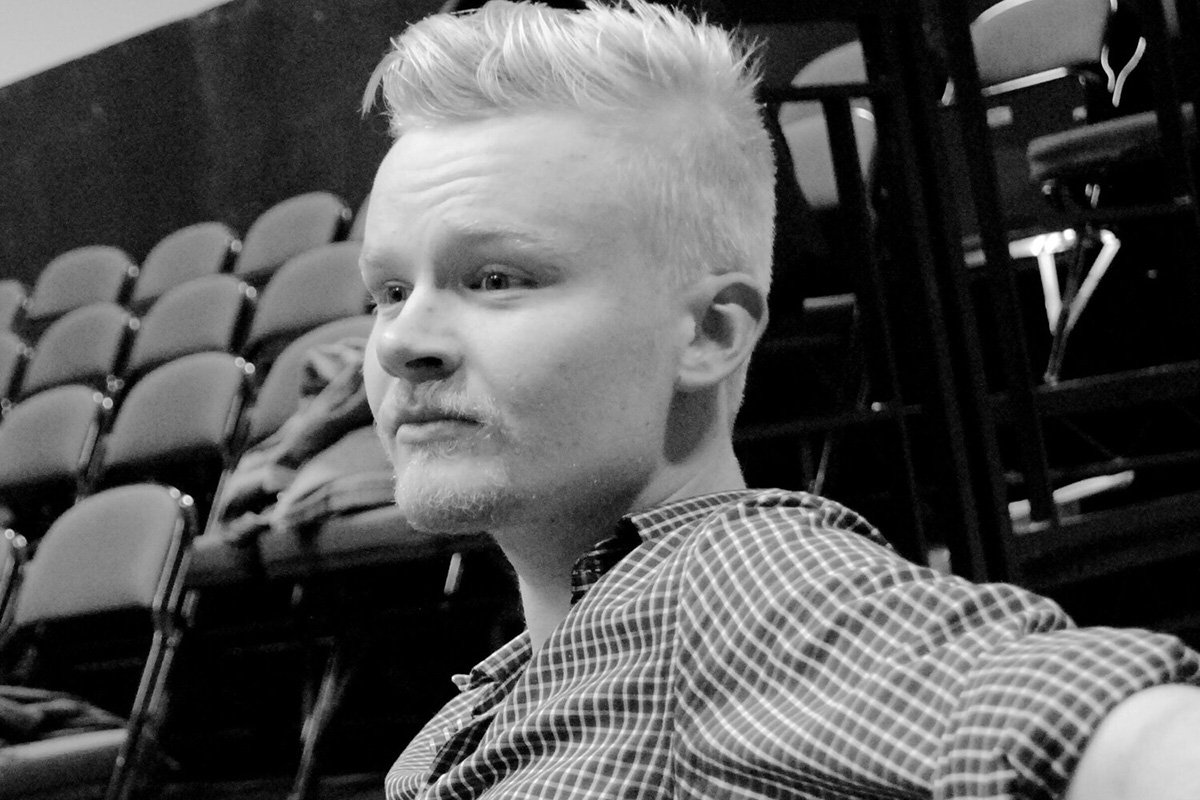
Funny, warm and insightful, James McDermott’s plays offer a unique perspective on life in Norfolk.
From tackling the issues of gentrification in Time and Tide (UK) to the yearning to grow outside of the confines of small town in Rubber Ring (UK), we discuss what inspired his stories and his advice to those wanting to write about the places they call home.
…
What was the catalyst for you wanting to become a playwright, sharing your ideas on stage to a live audience?
During my GCSES, I became obsessed with the comedy sketches of Mitchell & Webb and Fry & Laurie, and so decided to start writing and performing sketches at school. They went down well and making people laugh gave me a thrill, so I thought I wanted to be a sketch comedian, that is until I saw Alan Bennett’s film The History Boys (UK) then read the play text. Until that point, all the plays I knew of or studied at school were by unfunny, dead, straight men from London or America. As I was none of those things, I thought I couldn’t be a playwright, but Bennett’s work showed me that playwrights can be alive, funny, gay, working-class and from places other than London or America. This revelation coupled with the impact The History Boys play had on me as a closeted, bookish teenager made me want to become a playwright and write my truth as a funny, gay, working-class man.
You grew-up in the coastal county of Norfolk, where both Time and Tide and Rubber Ring are set. How did your experience of growing up here influence the stories you wanted to tell about those who call Norfolk home?
I was born and raised in Lincolnshire but moved to Norfolk as a teenager after holidaying there since I was born. Growing up in Norfolk as a teenager, I didn’t feel seen as East Anglia was rarely represented in drama. When it was, Norfolk was usually misrepresented in the punchline to Alan Partridge jokes as a small, backward and boring graveyard of ambition. But that wasn’t my Norfolk. To me Norfolk was, and is, beautiful and vast, and peopled by funny intelligent ambitious triers whose lives are just as interesting, dramatic and accidentally poetic as the lives of Northern and Southern characters we’re used to seeing onstage and screen. I think that sentiment and my desire to positively represent Norfolk influences all the stories I tell about the county.
Rubber Ring is very much a coming-of-age story focused around Jimmy who, though seen as a recluse by his mother, is actually yearning to explore life and his sexuality outside of his small town. What made you want to share his perspective?
I wanted to share Jimmy’s perspective as it was my perspective when I wrote the play and a perspective I hadn’t seen onstage before. Growing up as a sexually confused teenager in Norfolk, I felt invisible as rural LGBTQ stories were rarely, if ever, represented in drama. I wrote Rubber Ring to work through then confusing aspects of my identity, and I wrote it because it’s the play I needed to see in the world. I hoped that if I needed to see it, other rural LGBTQ audiences might need to see it too.
In Time and Tide, though it is in many ways a play about unity and relationships, it also reflects on the negative impact that gentrification and tourism can have on small, previously bustling, communities. Why do you feel it’s important to share stories of those communities who are experiencing this?
I believe it’s important to share stories of those communities experiencing the negative impacts of gentrification as in national conversations, gentrification and tourism are almost always represented as a positive thing for small communities and this isn’t always the case. The impact such change has on communities is rarely examined and so I wanted to write Time and Tide to explore that impact.
What do you hope that audiences will gain from engaging with your work?
I hope rural, East Anglian and LGBTQ audiences feel seen and understood. I hope non-rural and non-LGBTQ audiences re-see and better understand Norfolk lives, rural lives and LGBTQ lives. I hope all audiences see that working class characters can be just as funny, interesting, poetic, heroic and moving as the more conventional middle-class characters we’re used to seeing onstage. And, if I’m being honest, most of all, I hope that all audiences have a good laugh when they read or see my work!
Maybe it comes from those sketch writing days, but I love making people laugh more than anything and humour is so important to me in my practice as a playwright. Humour is such an integral part of representing working class life: my working-class family have a motto that ‘if you can laugh everything off, you’re bulletproof’. When audiences laugh along with your work, you know they’ve heard what you’ve got to say, processed it, it’s moved them and they’ve given a primal response to it. Humour is such a powerful way of knowing your voice and ideas are being heard, processed and felt.
Do you have any advice for anyone wanting to explore their own hometowns through their writing?
Go and talk to people in your hometown about their experiences of living there. It’s hard to write truthfully about a place without engaging with people from that place. Those people’s stories could also provide inspiration for characters, settings and conflicts in your plays.
Your hometown’s dialect is a heritage that can’t be put in a glass case in a museum so immortalise it and celebrate it by writing it in your plays. Suzanne Bell, dramaturg at the Royal Exchange, gave me the best advice about writing place. She said of a first draft of mine that my Norfolk characters felt like they lived in the city as their short snappy sentences of dialogue were, like city life, fast and frenetic. She suggested that, to capture the slow pace of life in Norfolk and the county’s characteristically flat landscape, my characters could speak in longer slower flatter sentences. This note changed how I write Norfolk people and how I evoke Norfolk through my dialogue. Ask of your hometown what the pace of life is there and what the landscape is like there then think about how you can reflect that energy and landscape in the shape of your dialogue.
…
Treat yourself to a copy of Time and Tide< em> and Rubber Ring today!
To discover more unique perspectives and original plays visit our shop.

Melody and Mastery: Celebrating Maury Yeston at 80

Deliciously Evil: Fabulous Villains to Play on Stage

